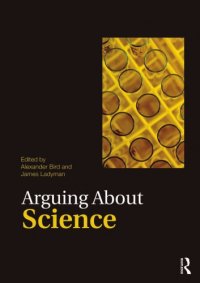
Ebook: Arguing About Science
- Tags: History & Philosophy, Science & Math, Philosophy, Aesthetics, Analytic Philosophy, Consciousness & Thought, Criticism, Eastern, Epistemology, Ethics & Morality, Free Will & Determinism, Good & Evil, Greek & Roman, History & Surveys, Individual Philosophers, Logic & Language, Medieval Thought, Metaphysics, Methodology, Modern, Modern Renaissance, Movements, Political, Reference, Religious, Social Philosophy, Politics & Social Sciences, Philosophy, Aesthetics, Epistemology, Ethics, History & Surveys, Logic, Metaphysics, Humanities
- Series: Arguing About Philosophy
- Year: 2010
- Publisher: Routledge
- Language: English
- pdf
The editors bring together some of the most influential contributions of famous philosophers in the field, including John Stuart Mill and Karl Popper, as well as more recent extracts from philosophers and scientists such as Ian Hacking, Stephen Jay Gould, Bas van Fraassen, Nancy Cartwright, and John Worrall. The anthology is organised into nine clear sections: • science, non science and pseudo-science • race, gender and science • scientific reasoning • scientific explanation • laws and causation • science and medicine • probability and forensic science • risk, uncertainty and science policy • scientific realism and anti-realism.
The articles chosen are clear, interesting, and free from unnecessary jargon. The editors provide lucid introductions to each section in which they provide an overview of the debate, as well as suggestions for further reading.Arguing About Science is an outstanding, engaging introduction to the essential topics in philosophy of science, edited by two leading experts in the field. This exciting and innovative anthology contains a selection of classic and contemporary readings that examine a broad range of issues, from classic problems such as scientific reasoning; causation; and scientific realism, to more recent topics such as science and race; forensic science; and the scientific status of medicine.
The editors bring together some of the most influential contributions of famous philosophers in the field, including John Stuart Mill and Karl Popper, as well as more recent extracts from philosophers and scientists such as Ian Hacking, Stephen Jay Gould, Bas van Fraassen, Nancy Cartwright, and John Worrall. The anthology is organised into nine clear sections: • science, non science and pseudo-science • race, gender and science • scientific reasoning • scientific explanation • laws and causation • science and medicine • probability and forensic science • risk, uncertainty and science policy • scientific realism and anti-realism.
The articles chosen are clear, interesting, and free from unnecessary jargon. The editors provide lucid introductions to each section in which they provide an overview of the debate, as well as suggestions for further reading.Arguing About Science is an outstanding, engaging introduction to the essential topics in philosophy of science, edited by two leading experts in the field. This exciting and innovative anthology contains a selection of classic and contemporary readings that examine a broad range of issues, from classic problems such as scientific reasoning; causation; and scientific realism, to more recent topics such as science and race; forensic science; and the scientific status of medicine.
The editors bring together some of the most influential contributions of famous philosophers in the field, including John Stuart Mill and Karl Popper, as well as more recent extracts from philosophers and scientists such as Ian Hacking, Stephen Jay Gould, Bas van Fraassen, Nancy Cartwright, and John Worrall. The anthology is organised into nine clear sections:
- science, non science and pseudo-science
- race, gender and science
- scientific reasoning
- scientific explanation
- laws and causation
- science and medicine
- probability and forensic science
- risk, uncertainty and science policy
- scientific realism and anti-realism.
The articles chosen are clear, interesting, and free from unnecessary jargon. The editors provide lucid introductions to each section in which they provide an overview of the debate, as well as suggestions for further reading.